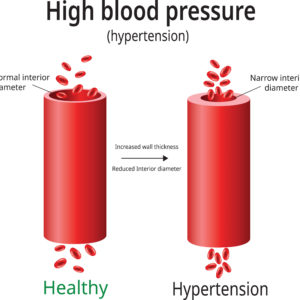THE FOLLOWING ARTICLE CAN BE FOUND PUBLISHED IN THE JAN/FEB AOA FOCUS MAGAZINE
High Blood Pressure
In the United States, one out of two adults have been diagnosed with hypertension, which makes up approximately 108 million people that suffer from high blood pressure. And out of that number, it is estimated that 82 million do not have the disease under control.
As part of the Hispanic community, having a family member with hypertension is very common. Everyone in my family has it, and because of its genetic component, I may have it in the future. Not only is the genetic part of the disease present for my family members, but there are also similar lifestyle choices influencing the diagnosis, for example, everybody eating the same delicious traditional Puerto Rican food, which happens to be not so good for you on an everyday basis.
Having a family history of hypertension is even more reason to make lifestyle modifications that can keep my pressure in check, especially since as an optometry student I am aware of the effects of hypertension on vision. Most people know what hypertension means and recognize its risk on overall health, but they are unaware of the ocular implications it may have.
 What exactly is hypertension?
What exactly is hypertension?
In 2017 the American Heart Association (AHA) and the American College of Cardiology (ACC) changed what was considered hypertensive in the past. Hypertension used to be thought of as having a blood pressure (BP) reading over 140/90 mm Hg or higher, but the updated guidelines characterize hypertension as any reading over 130/80 mm Hg or higher. These guidelines represent that lifestyle changes and pharmacologic therapy should be employed early in the course of the disease for its appropriate management.
Blood Pressure Classifications according to the AHA and ACC
|
Classifications |
Blood Pressure findings (mm Hg) |
|
Normal BP |
Less than 120 systolic and 80 diastolic |
|
Elevated BP |
Systolic between 129-129 and diastolic less than 80 |
|
Stage 1 |
Systolic between 130-139 or diastolic between 80-89 |
|
Stage 2 |
Systolic at least 140 or diastolic at least 90 |
|
Hypertensive crisis |
Systolic over 180 and/or diastolic over 120 |

How can high BP affect your vision?
Hypertension can have many detrimental effects in the body ranging from kidney disease to heart complications, but it is in the eyes where some of the first clues of uncontrolled blood pressure may appear. The disease can cause three types of damage in the ocular system: retinopathy, choroidopathy, and optic nerve neuropathy. Hypertensive retinopathy occurs when there is a lack of blood flow to the retina because of the vessel narrowing and damage that takes place in hypertension. Mild retinopathy typically does not present with symptoms and it could be discovered during a routine eye examination, however, in severe hypertension, the patient may report headaches and vision loss.
When eye doctors examine the fundus of a person with uncontrolled hypertension, they may find vessel narrowing, hemorrhages, cotton-wool spots, and exudates. Additionally, fluid can build up under the retina, which is known as choroidopathy and can lead to blurred or complete loss of vision. Lastly, the blocked flow of blood could damage the optic nerve, also leading to sight loss, this is known as optic neuropathy.
How can hypertensive retinopathy be avoided?
Evidence has shown that hypertensive retinopathy can act as a predictor of atherosclerotic diseases, the risk of stroke, and the overall state and prognosis of hypertension because it provides information about the structural damage suffered by the blood vessels. For this reason, it is important to maintain adequate levels of blood pressure by making lifestyle modifications that help reduce the risk factors, and by employing pharmacologic therapy depending on the severity of the disease.
If, like me, you have a family history of hypertension, the first step is to visit your primary care doctor to assess your overall health status, since catching the disease early can make a big difference in the treatment and prognosis. Additionally, the AHA recommends maintaining an ideal weight, increasing physical activity, limiting alcohol to 1-2 drinks per day, and having a heart-healthy diet. I am not suggesting eliminating grandma’s traditional food or the occasional dessert from your life, but rather to find a balance not only in our food choices but in our overall lifestyle to prioritize heart health.

